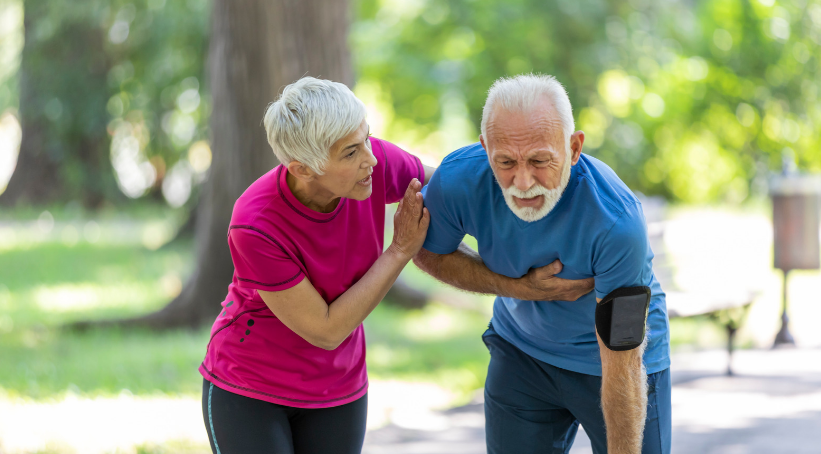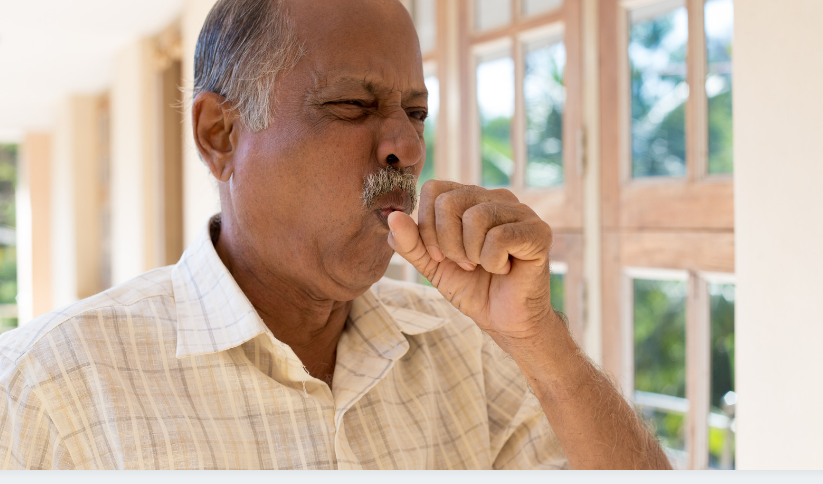Fluid in Lungs in The Elderly: Common Causes and Symptoms

Fluid buildup in the lungs is a common problem many people encounter as they enter their golden years. It can be dangerous, scary, and uncomfortable. Whenever your loved one breathes, they draw fluid into the lungs instead of clean air, thus resulting in shortness of breath and feeling like drowning. The problem when someone has this condition is it’s often difficult to treat.
It is very alarming to think about; however, when a person suffers from fluid buildup in their lungs, it doesn’t mean that it will end with lung failure. You can do things to slow down or stop the problem before it gets too bad. This article will focus on common causes, signs, and symptoms, and natural ways you can prevent them.
What Causes Fluid in Lungs in The Elderly?

Pulmonary Edema is the medical term for the build-up of fluid in your lungs. And it can be caused by more than dozens of different conditions; however, the following are some of the most common ones:
1. Heart Problems
Fluid in the lungs is a key symptom of heart disease. Heart failure and heart attack are leading causes of fluid buildup in the lungs. While treatments might help prevent one from getting this problem, it can be difficult to recognize before it occurs. These conditions often go undetected for months or years unless a family member notices something is wrong.
2. Kidney Disease
Fluid buildup in the lungs also happens due to poor kidney function. If a person is suffering from chronic kidney disease, they are more likely to have fluid buildup in the lungs. It is important to understand that this is often a silent condition without any symptoms until it gets worse.
3. Smoking
Cigarette smoking increases the risk of developing fluid buildup in the lungs and other respiratory conditions. Research shows that everything from chronic obstructive pulmonary disease to pneumonia is linked to smoking. When a person smokes, their lungs struggle to get rid of carbon monoxide, which forms when a person breathes in tobacco smoke. It builds up in the lungs and leads to fluid buildup.
4. Traveling to A High Altitude
Even going to a high altitude may lead to altitude pulmonary edema. It occurs between 2,500 and 8,000 ft. above sea level. It is a very painful condition that leads to shortness of breath, difficulty breathing, and dizziness. The person may feel suffocating and pass out in between breaths. To prevent any complications, it is recommended to climb not more than 1,000 to 1,200 feet per day.
Common Signs and Symptoms of the Condition

There are many signs and symptoms of pulmonary edema. Your elderly loved one may experience some or all of the following:
- Shortness of Breath
- Heart Palpitations
- Wheezing or Suffocating
- Blue-Tinged Lips or Body
- Excessive Sweating
If your loved one’s pulmonary edema is chronic, the symptoms and symptoms are less severe but will occur more often. They include:
- Shortness of Breath, especially when your loved ones are physically active
- Weight Gain
- Wheezing or Coughing
- Fatigue
- Swelling in The Lower Extremities
Simple Lifestyle Changes to Prevent Pulmonary Edema

Fluid in the lungs may sound scary and alarming, but there are a number of things you can do or suggest to prevent your loved one from acquiring this condition. These include:
1. Controlling The Blood Pressure
The best way to treat your loved ones’ edema is to prevent it. One of the most effective ways is to lower their blood pressure. Your loved one’s blood pressure should be kept under 130/80 or 140/90 or even a little lower as possible.
2. Keep Cholesterol Level Low
High cholesterol in the elderly can lead to clogged arteries and cause heart attacks and strokes. It may also cause the development of pulmonary edema. Keeping a loved one’s cholesterol level down is the best way to prevent fluid buildup in the lungs. The ideal cholesterol level should be less than 200 mg/dl. If your loved one is at risk for cardiovascular diseases, their (LDL) or Low-Density Lipoprotein cholesterol level should be lesser than 100 mg/dl, and their triglycerides should not exceed 150 mg/dl. Keep your loved ones’ cholesterol levels low by encouraging them to reduce saturated fats and trans fats, exercise, quit smoking, and reduce stress levels.
3. Eat A Heart Healthy Diet
A heart-healthy diet helps prevent fluid buildup in the lungs as it is low in saturated fats and cholesterol and high in fiber, omega three fatty acids, and other nutrients that keep arteries free of plaque. Foods that help include:
- Salmon
- Almonds
- Black Beans
- Tuna for Omega-3s
- Flaxseed
4. Reduce Salt Intake
Excess salt consumption can lead to water retention in the body, which may cause pulmonary edema. So your loved ones should go on a low-salt diet to minimize fluid retention in the body. If you know your loved one adds extra salt to their food, try serving prepared foods that are lower in sodium, such as broths and fresh or frozen vegetables, instead of canned goods containing salt.
5. Regular Exercise
Regular exercise helps your loved one prevent fluid buildup in the lungs. The key is to find a suitable exercise that they can do and stick with. Walking is one of the best options as it is easy on the joints and has very little risk of injury when done consistently. Your loved one should aim for at least 30 minutes of moderate activity every day. You can also provide them with exercise equipment at home to use.
6. Maintain A Healthy Weight
Being overweight leads to fluid buildup in the lungs. Maintaining a healthy weight is the best way to prevent fluid buildup. Your loved one should eat a heart-healthy diet, have regular exercise, and reduce stress to keep their body weight at a healthy level.
7. Quit Smoking
Smoking is harmful to the heart and lungs. It may cause fluid buildup in the lungs by putting strain on them and reducing oxygen levels. By quitting smoking, your loved one can decrease their risk of lung diseases like emphysema, which may lead to fluid in the lungs.
Final Thoughts
Fluid in the lungs in the elderly is not only life-threatening, but it can also be a symptom of another condition. If you notice these symptoms in your family member, it is best to get them checked out by a professional as soon as possible. Pulmonary edema can be treated with proper medication and treatments led by a knowledgeable medical team.
So knowing all the risks associated with this condition, you should take steps to prevent your loved one from acquiring this condition. By considering the tips mentioned above, you may prevent your loved one from this painful and dangerous condition.
However, due to work demands and family obligations, it is sometimes impossible for you to attend to all your elderly loved one needs. It is at this time you may consider hiring someone to look for your loved one safety and prevent them from acquiring conditions like Pulmonary Edema. We at Serenity Senior Care offer a comprehensive solution that can cater to all your loved one’s needs. Whether your loved ones have mobility issues or have mild or severe dementia, we can provide you with a team of compassionate caregivers who will ensure that your loved one is always safe and secure. To know more about our caregiving services, feel free to contact us at 973-338-0124 or through our contact us form.



Pingback: signs for fluid in the lungs – dataala
Pingback: signs and symptoms of fluid in lungs - datasblog.com
Pingback: signs of fluid in your lungs - datasblog.com
Pingback: signs of water retention in lungs - findadata
Pingback: signs of liquid in lungs - datasblog.com
Pingback: signs of fluid in your lungs – infopvp